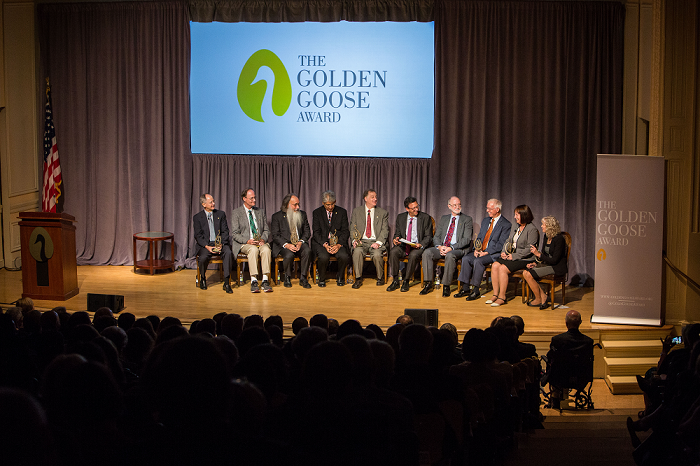
This year’s awardees reflecting on their research and the importance of federal funding. (Photo courtesy of the Golden Goose Award)

This year’s awardees reflecting on their research and the importance of federal funding. (Photo courtesy of the Golden Goose Award)
On Sept. 22, a coalition of scientific organizations held the fifth annual Golden Goose Award ceremony at the Library of Congress in Washington, D.C. Rep. Jim Cooper (D-TN) provided the initial inspiration for the award when he encouraged the scientific community to highlight instances in which obscure or odd-sounding federally funded research has had a significant positive impact on society.
Three groups of researchers were honored for their accomplishments at this year’s ceremony. Detailed information on the awardees, a documentary highlighting their research, and a video of the award ceremony are available on the Golden Goose Award website .
Rush Holt, CEO of the American Association for the Advancement of Science (AAAS) and a former congressman for New Jersey, underscored the purpose of the award at the beginning of the event:
The Golden Goose Award gives us a chance to tell some wonderful stories, maybe even have a little amusement or fun, but ultimately it’s really quite serious. It’s quite serious about how important taxpayer funding is for advancing our quality of life through research and development.
In addition to Cooper, Reps. Randy Hultgren (R-IL), Bob Dold (R-IL), Bill Foster (D-IL), and Sen. Chris Coons (D-DE) spoke at the event. National Science Foundation Director France Córdova and National Institutes of Health Director Francis Collins were among the attendees.
Alongside AAAS, over 20 scientific societies, universities, foundations, and companies sponsored the event, including the American Physical Society and the American Astronomical Society, both AIP Member Societies.
The Golden Goose Award is in some ways the opposite of the Golden Fleece Award , a monthly commendation of specific federally funded projects considered wasteful by William Proxmire, a Democratic senator for Wisconsin from 1957 to 1988. Foster, who grew up in Wisconsin, used his remarks to reflect on Proxmire’s legacy. He said that Proximire was “in many ways a wonderful member of Congress,” citing his efforts to combat genocide, but added, “there’s some things that he got wrong.” Foster then referred to the Golden Fleece Award as the “evil twin” of the Golden Goose Award.
“There’s a bipartisan stain on the attitude toward science that often comes out of Washington that we have to be very, very careful not to promulgate. You have to think separately about the issues of curiosity-driven research and research that’s driven for a particular application,” he concluded.

The first Golden Fleece Award. (Image credit – Wisconsin Historical Society)
Although the Golden Fleece Award is no longer awarded, it lives on in new forms, most recently via criticism of individual grants by members of the House Science Committee and the issuance of “wastebooks,” compilations of allegedly wasteful federal spending. Sen. Jeff Flake (R-AZ) has issued several wastebooks, the most recent entitled “Twenty Questions: Government Studies That Will Leave You Scratching Your Head .” NSF has issued a rebuttal to criticisms of NSF grants in this wastebook.
The first set of awards were given to leaders of the NIH-funded National Longitudinal Study of Adolescent to Adult Health, a landmark longitudinal study of over 20,000 adolescents. A precursor to the study, the American Teenage Study, was cancelled in 1991 after the project was characterized as a “teen sex study” and criticized by members of Congress.
The second set were posthumous awards for two Department of Agriculture researchers who in the 1950s developed a method for sterilizing screwworms using radioactive cobalt produced at Oak Ridge National Laboratory. At the time, screwworms were killing large numbers of U.S. livestock. Although the sterilization idea was initially ridiculed by their colleagues, it became instrumental to eradicating screwworms in North and Central America, ultimately saving the livestock industry billions of dollars. Despite these successes, research on the “sex life of the screwworm” was cited as an example of wasteful research by certain members of Congress in later decades.
The final set of awards were given to a group of systems engineers and biologists who collaborated to investigate if the process honey bees use to allocate foraging work across the colony could be applied toward developing more efficient computer algorithms. Their work received support from NSF and the Office of Naval Research. One outcome of the research was the development of a new computer server assignment algorithm now used by major web hosting companies.